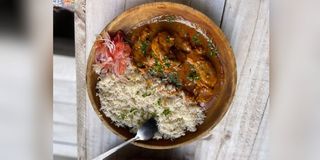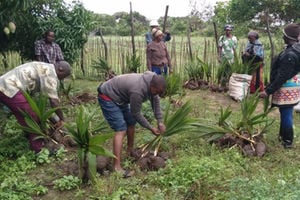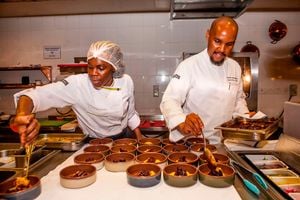
A Swahili dish. Coconut milk is used as an ingredient to make tasty dishes ranging from fish and beans to cassava. This has increased the popularity of the fruit, which is in high demand on the market.
Since time immemorial, coastal communities have relied on coconut trees for many uses. One of these uses is the preparation of savoury dishes using coconut milk.
Coconut milk is used as an ingredient to make tasty dishes ranging from fish and beans to cassava. This has increased the popularity of the fruit, which is in high demand on the market.
In recent years, however, the price of coconuts has skyrocketed beyond the reach of ordinary people. Restaurants that serve coconut-based dishes have increased their prices.
Although the main reason given for the sharp rise in coconut prices is often attributed to scarcity owing to low yields due to the effects of climate change effects, there are more causes.
It has emerged that tonnes of coconuts do not make it into the local market.
Interviews with various stakeholders in the sector revealed that coconut traders from Tanzania have been leasing farms in Kilifi County and then exporting the mature fruits to the neighbouring country.
Coconut stakeholders have now asked the government to come up with a policy to protect them against exploitation by exporters.
Mr Christopher Kitsao, a coconut farmer from Mbarakachembe in Watamu, said farmers were losing millions of shillings to Tanzanian traders due to the lack of a stable market in the country.
"Unfortunately, there is no reliable market for coconut farmers and we always depend on buyers from Tanzania who have always exploited us by buying a coconut at Sh5 maximum price," he said.
Mr Kitsao said farmers fell into the trap of exploitation because foreigners know they are stranded with their crops without a market.
He said some farmers harvest over 20,000 coconuts in a season and have nowhere to sell them.
A tug-of-war
"It is always a tug of war between farmers and the Tanzanian traders on the price before, settling on Sh5 per fruit. They know we are desperate to sell our products," he said.
A report released by the Kenya Coconut Development Authority in 2014 showed that the key coconut export destinations in 2011 were Tanzania (57.2 per cent), Uganda (14.91 per cent), USA (11.36 per cent) and Yemen (8.48 per cent).
Also read: Buyers turn to leeks on high onion prices
However, the report noted that the amount of coconuts getting into Tanzania may be more than that which is officially captured.
Kilifi County Chief Officer for Agriculture Teddy Nyawa said the upfront payment for coconuts by Tanzanian traders had subjected Kenyan farmers to economic slavery.
“If a farmer is a victim of economic slavery it becomes difficult to help him or her because they have already taken money from the buyer. It is as if the farmer has swallowed a bait,” he said.
Mr Nyawa added that apart from exploitation of farmers, exportation of coconuts has led to scarcity in the local markets, hence an increase in prices.
A medium-sized coconut now costs Sh60, up from Sh25 a few years ago, while a makuti broom which used to go for Sh20 now costs Sh50. A bottle of 250ml of pure coconut oil now costs Sh200, the 50ml bottle used to be Sh20 in shops, but now it is Sh50.
“The county government cannot interfere with the coconut business between the Tanzanians and our farmers because a marketplace is where the buyer and the seller are free to negotiate and come up with a price that is convenient to both. When the government comes in to set a minimum price, there must be an agreement. We cannot come in as a county government and set a minimum price for the coconut farmer or for the fruits,” he said.
Not an easy process
He said it was not an easy process, and attempts by the county government to intervene and rescue Kenyan farmers have failed.
Mr Nyawa said poverty eradication among coconut farmers is vital, and a lasting solution to curb economic slavery.
“As much as we keep on sensitising our farmers against selling coconuts at a throwaway price, it is still a big challenge because we will not have the solution to the problem soon due to poverty. However, we should strive to eradicate poverty by supporting our farmers to do value addition to their produce, and at the same time, diversify and do agri-business to supplement their income,” he said.
Mr Nyawa said even as the Agricultural and Food Authority (AFA) and county governments embark on a mission to plant many coconut trees and improve productivity in the sub-sector, farmers must safeguard themselves against exploitation.
According to a consultant for rural agricultural advisory services at the African Forum for Agricultural Advisory Services (AFAAS), Mr Baha Nguma, the traders have identified the gap in their coconut business and realised that Kenya had the solution.
Mr Nguma said open trade had contributed to the booming Kenya–Tanzania coconut business but has affected the subsector in the country.
“The biggest danger with the business is that our Tanzanian brothers are coming to purchase coconuts and other crops as raw materials and proceed to do value addition in their country,” he said.
Mr Nguma said the massive export of raw farm products to Tanzania meant there was no chance for Kenya to have a processing industry.
Mr Nguma said despite Kenya having an open market policy, there was a need for the country to protect coconut farmers.
“We need to legally protect the coconut tree because apart from fruit, there are many products that find their way in foreign countries like the brooms from makuti in Rwanda and Southern Sudan,” he said.
He said the country needed to create a conducive environment to attract investors by providing affordable licensing that takes a shorter time to be processed.
Sensitise farmers
In addition, the government should sensitise farmers to embrace massive coconut production as agri-business to benefit from different products.
The coconut tree has over 120 products.
“Because of the vulnerability of our people; poverty, hunger, and many financial demands, our coconut farmers are leasing their orchards for even up to two years or for seasons to Tanzania traders at very low prices of Sh50,000 to Sh100,000 for 12 acres of land,” he said.
He said a productive coconut tree gives an average of 50-70 fruits annually.
Technically, an acre of land has about 40 coconut trees, and if the farmer has 500 trees in about 12 acres and leases for a year at Sh100 000 then it means that the trader paid Sh200 for each tree, and if the tree produces 50 fruits, he purchased each at Sh4.
Mr Baha said a coconut farmer who leases 12 acres of land with about 500 trees gets about Sh100,000.
“For the lease period, the poor farmer does not own the coconut orchard, and the Tanzanian trader takes over until he gets his money.
“It is not so good, therefore, calls for urgent intervention by the government because it makes the farmer more vulnerable and a slave to Tanzanian traders,” he said.
Mr Nguma, a former Kilifi County Chief Officer for Agriculture, said the then Governor Amason Kingi enacted the Kilifi County Coconut Act, 2015 to protect coconut farming in the county.
The law had proposed the formation of a coconut board to take charge of the coconut management, including the formation of policies to improve coconut farming and production.
The board was also to organise, empower farmers, source markets for their products, and support their value addition.
"As of now, even if we come up with proposals and plans to set up industries for value addition for our cash crops in Kilifi, it will not be possible because of the scarcity of raw materials," he said.







